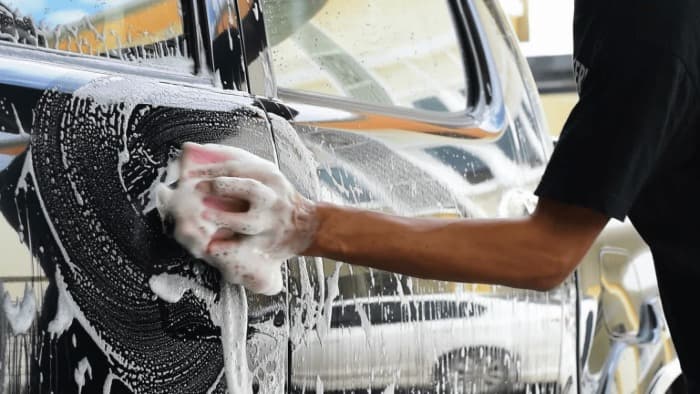Table of Contents
- Introduction to the Best DIY Car wash so
- Option 1: Dish Soap
- Option 2: Baby Shampoo
- Option 3: Baking Soda and Vinegar
- Option 4: Lemon Juice
- Option 5: Laundry Detergent
- Conclusion: The Best DIY Car Wash Soap for a Sparkling Clean Ride
- Frequently Asked Questions
Home » The 5 Best DIY Car Wash Soaps for a Sparkling Clean Ride
Introduction to the Best DIY Car wash so

Keeping your car clean is essential for a variety of reasons. Regular washing helps to maintain the appearance and value of your vehicle, and it can also improve visibility when driving. While plenty of commercial car wash products are available, making your car wash soap at home can be a cost-effective and eco-friendly alternative.
DIY car wash soaps meet your specific needs and preferences. In this article, we will introduce you to the five best DIY car wash soap options for a sparkling clean ride. These options range from household staples like dish soap and baby shampoo to natural ingredients like baking soda and vinegar. We will discuss the pros and cons of each option, as well as provide suggested dilution ratios and application methods. By the end of this article, you will have all the information you need to choose the best DIY car wash soap for your car. So, let’s get started!
Option 1: Dish Soap
You can use Dish soap, a common household staple, as a DIY car wash soap. It is effective at removing dirt and grime from the exterior of your car, and it is also readily available and inexpensive. However, it is important to be mindful of the type of dish soap you use. Some dish soaps can be harsh and strip the wax from your car’s paint, causing damage in the long run. It is best to choose a mild, pH-neutral dish soap that is specifically designed for washing dishes.
In using dish soap as a DIY car wash soap, we recommend to dilute it in a bucket of water before applying it to your car. A good rule of thumb is to mix 1 to 2 tablespoons of dish soap with 1 gallon of water. You can then use a sponge or a car wash mitt to scrub the mixture onto your car, starting at the top and working your way down. Be sure to rinse off the soap thoroughly with a hose or a pressure washer to avoid leaving any residue behind.
It is also important to avoid using dish soap on the interior of your car, as it can strip the protective coatings from the dashboard and seats. Stick to using it only on the exterior of your car for the best results. Overall, dish soap is an effective and budget-friendly option for a DIY car wash soap.
Option 2: Baby Shampoo
Baby shampoo is another popular choice for a DIY car wash soap, thanks to its gentle formula that is safe for all car surfaces. It is designed to be gentle on a baby’s delicate skin, so it is unlikely to cause any damage to your car’s paint or wax. Baby shampoo can also create a good amount of suds, which can add to the satisfaction of washing your car.
To use baby shampoo as a DIY car wash soap, you can mix it with water in a bucket according to your desired strength. A good starting point is to mix 1 to 2 tablespoons of baby shampoo with 1 gallon of water. You can then use a sponge or a car wash mitt to scrub the mixture onto your car, starting at the top and working your way down. As with any car wash soap, rinse the shampoo thoroughly with a hose or a pressure washer to avoid leaving any residue behind.
One thing to keep in mind is that some baby shampoos may contain fragrances or other additives that can leave behind a scent on your car’s exterior. If you are sensitive to scents or prefer a more neutral-smelling car, choose a baby shampoo that is unscented or made with natural ingredients. Overall, baby shampoo is a gentle and effective option for a DIY car wash soap suitable for all car surfaces.
Option 3: Baking Soda and Vinegar
Baking soda and vinegar are natural ingredients that can serve as a DIY car wash soap for a more eco-friendly option. Baking soda is a gentle abrasive that can be effective at removing stains and odors, while vinegar is a natural cleaner that can cut through grime and dirt. When combined, baking soda and vinegar can make a powerful cleaning solution for your car’s exterior.
To use baking soda and vinegar as a DIY car wash soap, you will need to mix them in a spray bottle. A good starting ratio is 1 part vinegar to 2 parts baking soda. You can then shake the bottle, mix the ingredients, and spray the solution onto your car’s exterior. Be sure to avoid spraying it directly onto any plastic or rubber surfaces, as the vinegar can cause them to become brittle over time. Instead, spray the solution onto a sponge or a car wash mitt, then scrub the mixture onto your exterior.
It is important to rinse off the baking soda and vinegar mixture thoroughly with a hose or a pressure washer, as leaving it on for too long or not rinsing it off can cause damage to your car’s paint. You should also be mindful of using this mixture in direct sunlight, as the baking soda can cause the paint to fade or discolor if left on for too long. If you use it properly,, baking soda and vinegar can be a natural and effective option for a DIY car wash soap.
Option 4: Lemon Juice
Lemon juice is a natural ingredient that can be a substitute to a car wash soap for a fresh-smelling and effective clean. Lemon juice is a natural bleach that can help to remove stains and give your car a refreshing scent. However, it is important to be mindful of the concentration of lemon juice you use, as it can be acidic and may cause damage to your car’s paint if left on for too long or not rinsed off properly.
To use lemon juice as a DIY car wash soap, you can dilute it in a bucket of water according to your desired strength. A good starting point is to mix 1 part lemon juice with three parts water. You can then use a sponge or a car wash mitt to scrub the mixture onto your car’s exterior, starting at the top and working your way down. As with any car wash soap, be sure to rinse off the lemon juice mixture thoroughly with a hose or a pressure washer to avoid leaving any residue behind.
Keep in mind that lemon juice can be drying, so we do not recommend to use it on your car’s interior. It is also best to avoid using it in direct sunlight, as the lemon juice can cause the paint to fade or discolor if left on for too long. Lemon juice is a natural and effective option for a DIY car wash soap that leaves your car with a fresh scent.
Option 5: Laundry Detergent
Laundry detergent is another household staple that can be a substitute for a DIY car wash soap. It is effective at removing dirt and grime from the exterior of your car, and it is also readily available and inexpensive. However, it is important to be mindful of the type of laundry detergent you use. Some laundry detergents can be harsh and strip the wax from your car’s paint, causing damage in the long run. Choosing a mild, pH-neutral laundry detergent specifically designed for washing clothes is best.
In using laundry detergent as a DIY car wash soap, we recommend diluting it in a bucket of water before applying it to your car. A good rule of thumb is to mix 1 to 2 tablespoons of laundry detergent with 1 gallon of water. You can then use a sponge or a car wash mitt to scrub the mixture onto your car, starting at the top and working your way down. Ensure to rinse the soap thoroughly with a hose or a pressure washer to avoid leaving any residue.
It is also important to avoid using laundry detergent on the interior of your car, as it can strip the protective coatings from the dashboard and seats. Stick to using it only on the exterior of your car for the best results. Overall, laundry detergent is an effective and budget-friendly option for a DIY car wash soap, as long as it is used properly.
Conclusion: The Best DIY Car Wash Soap for a Sparkling Clean Ride
In this article, we have introduced you to the five best DIY car wash soap options for a sparkling clean ride. These options range from household staples like dish soap and baby shampoo to natural ingredients like baking soda and vinegar. We have discussed the pros and cons of each option, as well as provided suggested dilution ratios and application methods.
It is important to remember to test a small, inconspicuous area of your car before applying any new cleaning product to its exterior. This will allow you to see how the product reacts with your car’s paint and ensure that it does not cause any damage. It is also a good idea to experiment with different options to find the best DIY car wash soap for your individual needs and preferences.
In conclusion, regular car washing is important for maintaining the appearance and value of your vehicle. A DIY car wash soap can be a cost-effective and eco-friendly alternative to commercial products. Following the tips and guidelines provided in this article, you can choose the best DIY car wash soap for a sparkling clean ride.
Frequently Asked Questions
What are the benefits of using a DIY car wash soap?
There are several benefits to using a DIY car wash soap:
-Cost-effective: Making your car wash soap at home can be cheaper than purchasing commercial products.
– Eco-friendly: DIY car wash soap can be made using natural ingredients or household staples, reducing the number of chemicals and plastic packaging used.
-Customizable: DIY car wash soap can be customized to meet your specific needs and preferences, such as choosing a natural or fragrant option.
Can baby shampoo be used on the interior of my car?
While baby shampoo is generally safe for all car surfaces, we do not recommend using it on your interior. Baby shampoo may contain fragrances or additives that can leave behind a scent on your car’s dashboard and seats. It is best to use a specialized interior cleaner for these surfaces.
Can baking soda and vinegar be used on all car surfaces?
No, it is important to be mindful of the surfaces you use baking soda and vinegar on. Baking soda is a gentle abrasive that can effectively remove stains, but it can also cause damage to your car’s paint if left on for too long or not rinsed off properly. Vinegar is a natural cleaner that can cut through grime and dirt but can also cause plastic and rubber surfaces to become brittle over time.
Can lemon juice be used on the interior of my car?
No, it is not good to use lemon juice on your car’s interior. Lemon juice is a natural bleach that can help to remove stains and give your car a refreshing scent, but it can also be drying. Using a specialized interior cleaner for the dashboard and seats is best.


